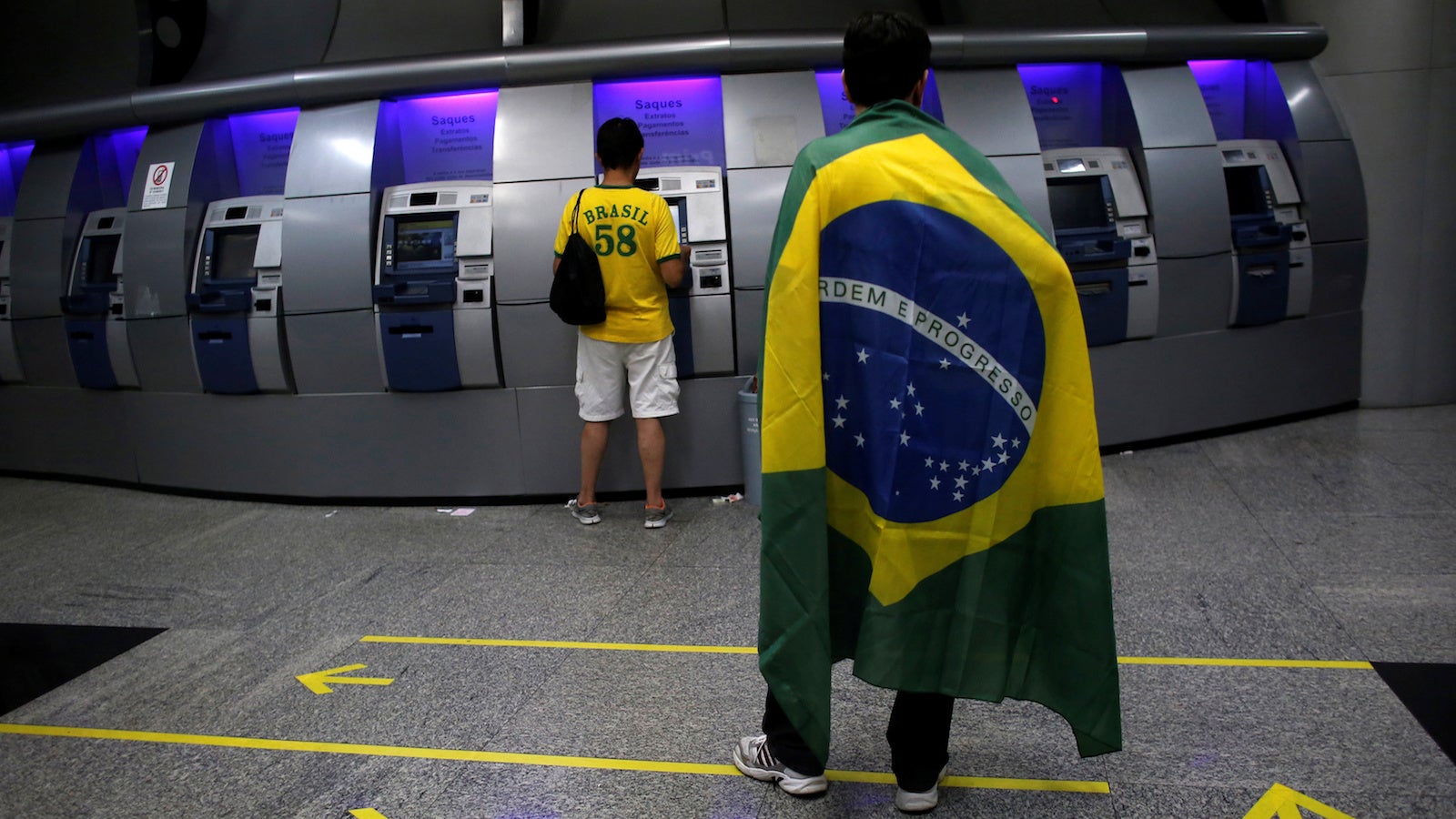Americans are finally about to get online banking features that Brazil has enjoyed for years
Electronic bill paying. Instant cash transfers between friends. Same-day check clearing. Digital banking is entering a new age in the US—but it’s an age that many developed and developing countries have been living in for some time already.


Electronic bill paying. Instant cash transfers between friends. Same-day check clearing. Digital banking is entering a new age in the US—but it’s an age that many developed and developing countries have been living in for some time already.
Previously repressed by US regulations, industry inertia, and American consumer wariness, digital banking is about to finally become commonplace thanks to the money-transfer service Zelle. Developed by a consortium of major banks using the banks’ existing customer account bases, Zelle hopes to compete against PayPal, Venmo, and Square Cash. While it may seem revolutionary to Americans, consumers in Brazil, Norway, Australia, and other countries have been casually using similar technologies for over a decade.
Mired in regulation and insulated from fierce competition, the American banking sector hasn’t seemed too eager to innovate. The Global Banking Innovation Awards in 2015 named only one US bank, and it was a credit union with a social-justice agenda. Meanwhile, Germany’s Fidor Bank offers credit transfers via Twitter, Hong Kong’s BEA has set up digital branches in malls with touchscreen video access to tellers, and Poland’s Idea Bank installed ATMs in a fleet of BMWi3s that come to consumers via an app.
And then there’s Brazil. Though the country is not without its own financial strife, its digital banking systems far surpass America’s. In the first six months of this year, Bitcoin trading volume beat out gold on the Brazilian Securities, Commodities, and Futures Exchange. Brazilian banks are also ahead of the rest of the world in biometrics: Banco Bradesco clients don’t even need an ATM card—just their password and a touch on the hand scanner. For decades, Brazilians have been paying bills electronically and transferring cash instantly, first at ATMs, now on smartphones. A credit check takes three seconds online, and checks clear in a day. Meanwhile, in the US, it took a 2004 law, the Check 21, to end the banking practice of transporting paper checks across state lines while customers waited up to 11 days for their checks to clear.
Brazil’s banking harkens back to its hyperinflationary past in the 1980s and 1990s. With daily inflation at 100%, your paycheck could halve in value by the next day. Money had no time to move, because if the move took time, value was lost. Supermarkets were therefore jammed on payday as consumers sought to buy food before their paycheck became worthless. Brazilian insurance companies marketed not their coverage, but their ability to pay a claim in a matter of hours.
The American banking system hasn’t been pushed to evolve in the same way. According to Gallup, 1 in 4 Americans has “very little” trust in banks, a distrust that has been growing over the past decade. Even with electronic banking making its way into American homes, consumers are still wary about electronic payments and instant clearing.
That’s partly because there’s a change of mindset involved: Some people can’t relinquish the implicit authorization in making each and every payment manually. Some don’t have smartphones. Others worry about the financial boogeyman: What if a stolen check was signed fraudulently and cleared too quickly? Couldn’t someone hack into your online account and transfer out your entire paycheck when it hit?
No—at least not according to the now-established practices and experience of other countries. For example, signatures on Brazilian checks are actually… checked. You can also block a lost check—or your entire checkbook—online instantly. When it comes to money transfers, small amounts flow freely, whereas larger sums have larger hurdles. Sure, you can transfer cash to your plumber online with the tap of an app, just not any plumber. First, they must be “registered” as a preferred recipient, with a pre-established transfer limit, which is followed by a 30-day waiting period while the registration takes effect. In the meantime, small daily transfers are permitted, but only up to a certain daily limit. But even once you’ve cleared the basic hurdles, large transfers are protected by further security measures: a device-based multi-factor authentication platform generates an electronic password through your app or a special keychain i-Token. A vegetable in a Brazilian steakhouse stands a better chance in stealing money nowadays.
As always, however, there is a downside: In part as it was such an early adopter of online banking, cyber-thieves were born when security was more lax. Weak legislation and enforcement fuel perpetrators, who now extend their reach internationally. But it’s not just South America. New banking channels bring new scams around the world: In the US, cyber-thieves are using malware to gain access to US bank accounts through mobile phones. In the UK, financial fraud was up 26% in 2015, driven by remote banking activities.
Despite the risks, Zelle and other digital financial services aim to provide American consumers with the same easy money transfers already standard in many other regions of the world. Soon you will be able to chip in your share of a dinner out with friends directly through your bank with the same tap of an app as you can in Brazil. More than just another virtual banking option, Zelle is an attempt by the big banks to address the changing banking needs of the American consumer—and it’s far overdue.